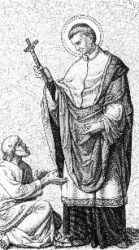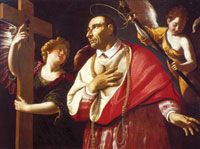Today, November 4, we also celebrate the feast day of Saint Charles Borromeo (1538-1584), patron saint of catechists and catechumens, Archbishop of Milan, inspiration to many religious orders, and example of discipline and zeal for the Lord. Saint Charles is a leading figure in the Catholic reformation.
Born in 1538 in the castle of Arona (outside Milan, Italy), Charles was the son of Count Gilbert Borromeo, a descendant of one of the most ancient families of Lombardy. Charles’ father, the count, was known for his piousness, charity and alms-giving, and rigorous fasting and abstinence from meat. Charles’ mother, the Countess, was also exceptionally virtuous. As a whole, Charles’ extended family demonstrated great piety, with his uncle becoming Pope Pius IV.
From an early age—in fact, as soon as Charles could begin determining his own course of study-- it became clear that he as destined to work in the vineyard of the Lord. Despite a serious speech impediment, he proclaimed the good news of Christ, and demonstrated His virtues in his interactions with all he encountered. When he was twelve years old, Charles was entrusted (legally) with the oversight of an abbey, and was frequent to remind his father that any revenue was to be given directly to the poor. At that same time, he received the clerical tonsure (the haircut of the monk), and was sent to a Benedictine Abbey to prepare for a religious life.
Charles’ father died when Charles was just twenty years old, and he left his studies of law to return home. Upon settling his father’s affairs, he continued his studies, earning his doctorate. When he was just 21, upon the elevation of his uncle to the papacy, he was appointed cardinal, and at 22, the Archbishop of Milan. His uncle, Pope Pius IV, assigned to him the administrative duties of Rome, however—a position that generally required many years in service and great practical and theological wisdom and prudence.
Charles served admirably (yet humbly), maintaining delicate papal relations with other nations, as protector of Portugal and the Low Countries, and the head of the Knights of Malta, and the Orders of Carmel and Saint Francis.
Actively engaged in the reformation of the Church, Charles was instrumental at the Council of Trent. There, he participated in the majority of the 25 sessions. Among his many statements:
“Let us fear lest the angered judge say to us: If you were the enlighteners of My Church, why have you closed your eyes? If you pretended to be shepherds of the flock, why have you suffered it to stray? Salt of the earth, you have lost your savor. Light of the world, they that sat in darkness and the shadow of death have never seen you shine. You were apostles; who, then, put your apostolic firmness to the test, since you have done nothing but seek to please men? You were the mouth of the Lord, and you have made that mouth dumb. If you allege in excuse that the burden was beyond your strength, why did you make it the object of your ambitious intrigues?”
When the Council of Trent reached it’s conclusion, Charles declared his intent to leave Rome and return to Milan to attend to his diocese. The urgency of the situation there persuaded the Pope to consent regretfully to his departure. Saint Charles intended to put into execution the reforming decrees of the Council, create seminaries and schools and in general restore discipline in the Church of Milan. This, as with all he undertook, he achieved with hard work, patience, and arduous zeal. He, himself, visited the most remote corners of his diocese, traveling in mountainous regions amid the greatest dangers, which he regarded as nothing unusual, and unworthy of mention. He was criticized for his unwavering enforcement of reform, and bore this criticism with joy. To his most ardent critic, he bequeathed a pension for life, treating him with the greatest respect and consideration while he lived. To himself, he imposed the most severe austerities and penances, spending his days in fast and prayer, refusing at times to even venture outside. When it was suggested to him that he might take some fresh air, the holy Archbishop replied that the Holy Scriptures should be his garden.
Despite his strict adherence and inflexibility, Saint Charles love of his congregation, neighbors, critics, and especially the poor, was overflowing and unstoppable. He served all in need, oftentimes depriving himself to do so. When the plague raged in Milan, he sold his household furniture, even his bed, to aid the sick and needy, and thereafter slept upon bare boards. He visited those stricken by the disease, consoled them as a tender father, conferred upon them the sacraments with his own hands. A true mediator, he implored forgiveness day and night between enemies and those in disagreement. He once ordered an atonement procession and appeared in it with a rope about his neck, with bare and bloody feet, a cross upon his shoulder—thus presenting himself as an expiatory sacrifice for his people to ward off divine punishment. His sermons were legendary for their powers of conversion, and the schools he established for their instruction of youth in the Christian faith and doctrine. In total, the schools he established numbered seven hundred and forty, in which over three thousand catechists were employed, presiding over forty thousand students.
Saint Charles died at the young age of forty-six, dressed in sackcloth and ashes, holding a picture of Jesus Crucified in his hands. His last words were, "See, Lord, I am coming, I am coming soon." His relics are enshrined in a white marble tomb at the Cathedral of Milan. Numerous miracles have been reported there, by the power of his intercession.
Saint Charles was one of the towering figures of the Catholic Reformation, a patron of learning and the arts, and though he achieved a position of great power, he used it with humility, personal sanctity, and unselfishness to reform the Church of the evils and abuses so prevalent among the clergy and the nobles of the times. He is remembered as a model priest and bishop, exhibiting great simplicity, piety, generosity, and self-sacrifice. His example reminds us today of the need for reform, the need to embrace the doctrine of the Church, and call to self-sacrifice for the expiation of the sins of those in need.
Pope Paul V said of Saint Charles: “The Lord alone performs great wonders and in recent times He has accomplished marvelous things among Us. In His wonderful dispensation He has set a great light on the Apostolic rock when He singled Charles out of the heart of the Roman Church as the faithful priest and good servant to be a model for the pastors and their flock. He enlightened the whole Church from the light diffused by his holy works. He shone forth before priests and people as innocent as Abel, pure as Enoch, tireless as Jacob, meek as Moses, and zealous as Elias. Surrounded by luxury, he exhibited the austerity of Jerome, the humility of Martin, the pastoral zeal of Gregory, the liberty of Ambrose, and the charity of Paulinus. In a word, he was a man we could see with our eyes and touch with our hands. He trampled earthly things underfoot and lived the life of the spirit. Although the world tried to entice him he lived crucified to the world. He constantly sought after heavenly things, not only because he held the office of an angel but all because even on earth he tried to think and act as an angel.”
Selected Quotation of Saint Charles Borromeo
“I admit that we are all weak, but if we want help, the Lord God has given us the means to find it easily. Would you like me to teach you how to grow from virtue to virtue and how, if you are already recollected at prayer, you can be even more attentive next time, and so give God more pleasing worship? Listen, and I will tell you. If a tiny spark of God’s love already burns within you, do not expose it to the wind, for it may get blown out. Keep the stove tightly shut so that it will not lose its heat and grow cold. In other words, avoid distractions as well as you can. Stay quiet with God. Do not spend your time in useless chatter. If teaching and preaching is your job, then study diligently and apply yourself to whatever is necessary for doing the job well. Be sure that you first preach by the way you live. If you do not, people will notice that you say one thing, but live otherwise, and your words will bring only cynical laughter and a derisive shake of the head. We must meditate before, during and after everything we do. The prophet says: “I will pray, and then I will understand.” This is the way we can easily overcome the countless difficulties we have to face day after day, which, after all, are part of our work. In meditation we find the strength to bring Christ to birth in ourselves and in other men.”
We beseech Thee, O Lord, keep Thy Church under the continual protection of Saint Charles Thy Confessor and Bishop; and as his pastoral care made him glorious, so may we through his intercession every grow in fervor of love for Thee. Amen.
Year 2: Day 308 of 365
Prayer Intentions: Strength to Self-Sacrifice for the sins of others; Church reform; Patience; Humility; Single-mindedness in serving the Lord
Requested Intentions: Restoration of a marriage (A); Peace and tolerance in a family, support for those with Parkinson’s Disease (M); For the restoration of a daughter’s marriage, end to debt (S); Employment and continued strength (K); Successful examinations for a son (J); Employment and blessings of a child (S); Employment and financial security (F); Successful work placement, continued health (A); Grace and healing for a family (P); Healing of a father (M); Academic success for son, employment for husband and brother (B); Freedom from anxiety and panic attacks (R); Health and healing in preparation for surgery (C); Healing of a chronic illness (P); Safety of a family during storms (A); Successful home ownership (P); Healing of a marriage (M); Employment for a husband, blessings for a marriage (E); Successful examinations for a daughter, healing of a relationships (V); Blessing for a family (V); Healing of baby girl M and all children suffering (M); Special intentions (R); Business success, peace, health (E); Conversion and deliverance of those who suffer, increase in vocations (M); Financial security and safe housing (M); For a daughter (K).






















0 comments:
Post a Comment
Thanks for leaving a comment. If you wish to submit a prayer request, however, please do so above, using the "Contact" tab.